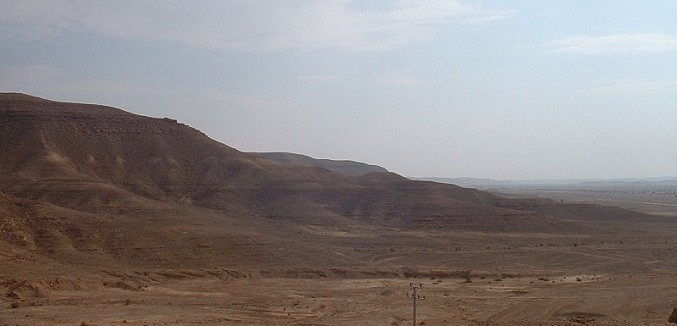An expose published earlier this week by Jane’s Defense Weekly and unpacked in an article published yesterday by the Telegraph discloses that Saudi Arabia is maintaining a ballistic missile base “deep in the Saudi desert” with surface-to-surface missiles oriented toward, and capable of striking, Tel Aviv and Tehran.
Analysts who examined the photos spotted two launch pads with markings pointing north-west towards Tel Aviv and north-east towards Tehran. They are designed for Saudi Arabia’s arsenal of lorry-launched DF 3 missiles, which have a range of 1,500-2,500 miles and can carry a two-ton payload.
The base, believed to have been built within the last five years, gives an insight into Saudi strategic thinking at a time of heightened tensions in the Gulf.
The Telegraph quotes Robert Munks, deputy editor of Jane’s Intelligence Review, to the effect that “this base is either partly or fully operational, with the launch pads pointing in the directions of Israel and Iran respectively.” The revelation will be read against deepening fears that Saudi Arabia is upgrading its ballistic assets in response to fears that Iran is advancing toward developing a nuclear weapon.
Saudi Arabia has for decades been in possession of missiles capable of being fit with nuclear warheads, and the Kingdom has been explicit that it will respond to Iranian nuclear weapons acquisition by abandoning its nonproliferation obligations and building its own arsenal.
Prince Turki al-Faisal, a former Saudi intelligence chief and ambassador to Washington, warned senior Nato military officials that the existence of such a device “would compel Saudi Arabia … to pursue policies which could lead to untold and possibly dramatic consequences”.
He did not state explicitly what these policies would be, but a senior official in Riyadh who is close to the prince said yesterday his message was clear.
“We cannot live in a situation where Iran has nuclear weapons and we don’t. It’s as simple as that,” the official said. “If Iran develops a nuclear weapon, that will be unacceptable to us and we will have to follow suit.”
Similar calculations have been expressed by Iranian rivals throughout the region, with Sunni countries warning that Iran’s atomic program, which is widely assumed to have a clandestine component, risks “a grave and destructive nuclear arms race in the region.”
A fall 2012 poll conducted in Egypt by The Israel Project showed that an overwhelming 87 percent of Egyptians, against the backdrop of Iran’s nuclear program, also want to obtain nuclear weapons.
[Photo: BetacommandBot / Wiki Commons]




